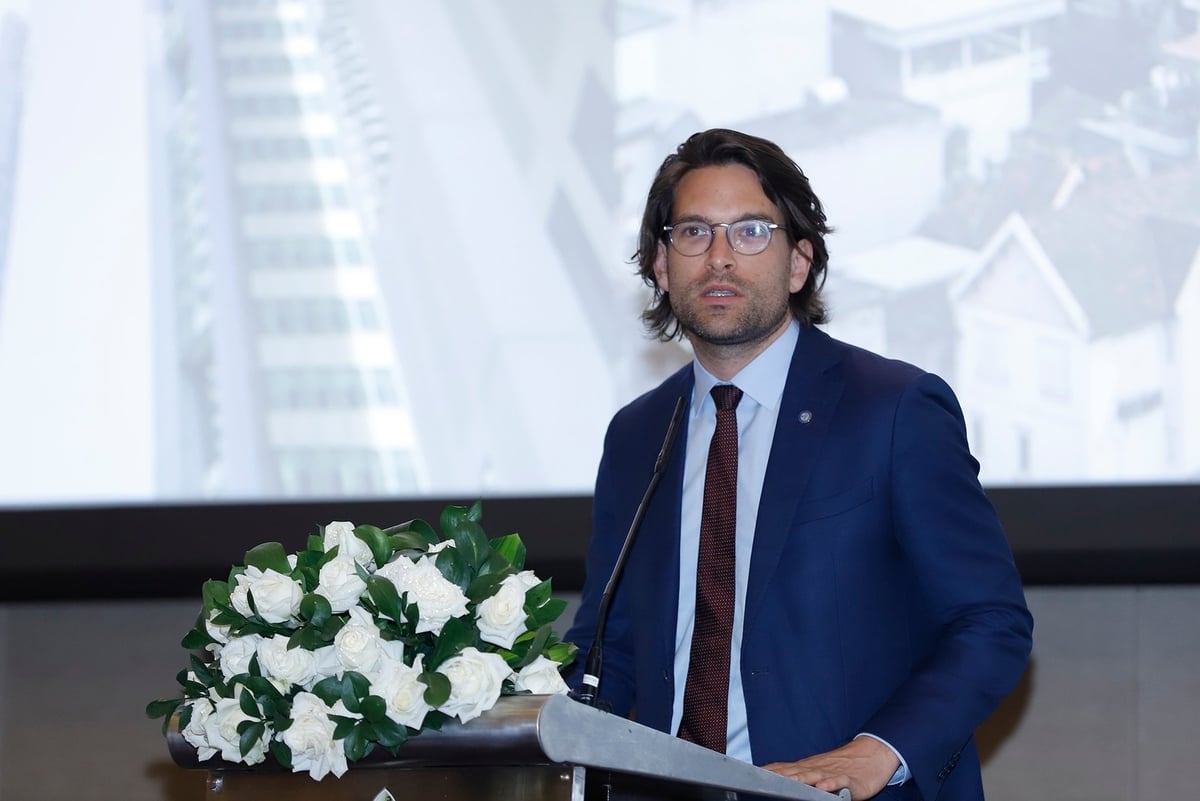December 7, 2025 | 00:28 GMT +7
December 7, 2025 | 00:28 GMT +7
Hotline: 0913.378.918
December 7, 2025 | 00:28 GMT +7
Hotline: 0913.378.918
On the morning of April 24, the Ministry of Agriculture and Environment (MAE) in coordination with the Ministry of Health, the United Nations Development Programme (UNDP), and the World Health Organization (WHO) held the National Scientific Conference on Combatting Air Pollution and Improving Air Quality in Vietnam.
Providing updates on the health and socio-economic impacts of air pollution, Mr. Sandro Demaio, a medical officer from WHO, highlighted that the annual exposure to fine particulate matter PM2.5 concentrations in cities around the world between 2010 and 2019 remained extremely high, averaging 40 μg/m³, compared to the WHO guideline of just 5 μg/m³.

Mr. Sandro Demaio, medical officer from the World Health Organization (WHO), spoke at the National Scientific Conference on Combatting Air Pollution and Improving Air Quality in Vietnam. Photo: Khuong Trung.
Air pollution causes numerous acute and chronic health conditions, including respiratory diseases, cardiovascular disorders, metabolic syndromes, as well as brain damage and mental health issues. Therefore, air quality control must be approached comprehensively not only from a medical perspective but also in relation to social factors, quality of life, public health, and especially equity in access to a clean and healthy living environment.
“Even at low levels of exposure, air pollution has a significant impact on human health,” Mr. Sandro Demaio emphasized.
In addition, air pollution poses serious risks to children’s health, as they are more vulnerable than adults. Early exposure to polluted air can lead to delayed physical development, psychological and behavioral disorders, chronic illnesses, asthma, childhood cancer, and reduced lung function, even at low levels of exposure.
According to Mr. Demaio, at the current pace, it will be difficult to meet the targets set out in the Sustainable Development Goals (SDGs). To truly protect human health and the living environment, air pollution interventions need to be intensified by a factor of 7 to 9.
According to UNDP specialist in Vietnam, Mr. David Payne, air pollution causes severe global damage, with economic losses reaching up to USD 6 trillion annually and a 5% reduction in global GDP due to its impact on health, productivity, and life expectancy.

Mr. David Payne, UNDP specialist in Vietnam. Photo: Khuong Trung.
According to the Intergovernmental Panel on Climate Change (IPCC), super pollutants - also known as short-lived climate pollutants, are identified as the cause of half of the current global temperature rise. It is estimated that up to 85% of global air pollution originates from the burning of fossil fuels and biomass. (National Center for Biotechnology Information, 2017).
"Reducing air pollution is directly linked to the achievement of the Sustainable Development Goals (SDGs)," Mr. David stated, adding that controlling air pollution not only promotes progress in health, climate, and economic development goals, but also contributes to reducing social inequalities. Investing in clean air is a strategic move that brings comprehensive benefits. Only 9% of countries have ambient air quality standards for PM2.5 that meet World Health Organization (WHO) guidelines.
Moreover, the public is increasingly concerned about the impact of air pollution on health, especially during the winter season, when pollution levels tend to be higher. According to surveys, at least 50% of residents in Hanoi, Ho Chi Minh City, and surrounding areas feel the need to wear masks to protect themselves from polluted air.
Several UNDP initiatives have improved environmental quality in major cities worldwide by applying technologies such as artificial intelligent (AI) and remote sensing to monitor air quality. The organization has developed a case study on Beijing’s Clean Air Action Plan to share best practices and encourage similar actions in other countries.
To achieve clean air for all, UNDP recommends strengthening air quality governance and calls for strong public participation.
Asia, home to 61% of the world’s population, currently emits 59% of global CO2 and relies on coal for 43% of its energy consumption. The region is facing numerous long-term impacts from air pollution, affecting not only physical health but also mental and behavioral well-being. According to OpenAQ, 36% of countries, representing nearly one billion people, are not currently monitoring their air quality. Most of these countries are low-income or lower-income countries.
Translated by Kieu Chi

(VAN) As of 2025, the ASEAN region has a total of 69 ASEAN Heritage Parks recognized across its 10 member states. Among them, Viet Nam contributes 15 ASEAN Heritage Parks.

(VAN) Yok Don National Park has high biodiversity with numerous endemic plant and animal species, and it is also the only dipterocarp forest ecosystem conservation area in Viet Nam.

(VAN) Viet Nam and Brunei signed two important MOUs on fisheries and IUU, expanding cooperation in agriculture, the environment, and Halal exports, aiming to substantively implement joint projects.

(VAN) The Viet Nam Coconut Association worked with the International Finance Corporation (IFC) and businesses to promote the supply chain, enhance competitiveness, and develop the coconut industry sustainably.
![Hue aims for Net Zero: [2] Pioneering low-emission tourism](https://t.ex-cdn.com/nongnghiepmoitruong.vn/608w/files/huytd/2025/12/04/0633-dulichzero-4-095634_236-161125.jpg)
(VAN) The ancient capital of Hue has developed Net Zero tourism products and models, aiming to reduce carbon emissions and pioneer the establishment of Viet Nam's green tourism destination.

(VAN) C.P. Viet Nam has announced the successful completion of its goal to plant 1.5 million trees during the 2021-2025 period, a key milestone within company's long-term ESG strategy and its roadmap for emission reduction.

(VAN) This is an initiative of MAE aimed at creating a unified coordination mechanism to implement agricultural cooperation programs with developing countries.